|
De Duitse schrijfster Antje Rávic Strubel werd geboren op 12 april 1974 in Potsdam. Zie ook alle tags voor Antje Rávic Strubel op dit blog.
Uit: Snowed Under (Vertaald door Zaia Alexander)
“Postal clerk Erik M. Broda, retired for three weeks, though still working part-time, eagerly awaits his female superior Simona’s arrival, so he can give her a special wink as he slams his cancellation stamp on the wrong side of a postcard to Mainz. He doesn't like the card. He has read hundreds of postcards like it in his career.
Whenever he doesn’t like a postcard, he stamps the postmark wrong side up. Bad postcards are like female superiors. They gab a lot and then forget the most important things. The most important things for a postcard are: first, the stamp, second, the postal code, and third, the signature. The signature is missing on this one.
He covers the card with his left palm, sohe’s just able to read the message, and pulls over a stack of thick envelopes in need of postmarking. The stamp hovers in his fist halfway above the desk. That way he can slam it down if Simona came in by surprise.
Ever since she started working here, everything has changed. Back then, he could be sure nobody
would disturb him.
Dear Haschi,
Unfortunately, I couldn’t find a funny postcard for you. All they’ve got are ones with sunsets or with Rübezahl, the mountain spirit, on the front. At least they’ve got super yummy dumplings and pancakes and gorgeous wild icicles. I’m drinking lots of mulled wine with Evy. I’d love to know what’s going on in her head, like you always knew with me. Bet she’d like that. But I don’t. Say hi to C., whoever he is. You’re a lot happier, since you’ve been together with him. Laughed more last time. Would love to be with you again, but could it work after all these years?
The card makes him angry. There was enough space for a signature. What angers him most, though, is that the card had obviously been written by a man. He admires women. They are completely perfect beings, right from the start, they help him differentiate one day from the next; they give him a rhythm, like Simona with her irregular visits to his office. But he doesn’t expect precision from women. They’ve
overtaken us, he thinks, but they’ll never take over. He imaginesthey’ll just keep climbing higher than him in the future.”
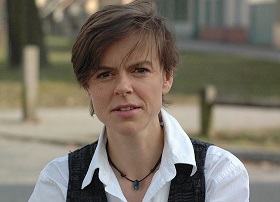
Antje Rávic Strubel (Potsdam, 12 april 1974)
De Britse blijspelauteur Alan Ayckbourn werd geboren op 12 april 1939 in Londen. Zie ook alle tags voor Alan Ayckbourn op dit blog.
Uit: Confusions
„Lucy (as she goes) Sit still. Don't run around. I won't be a minute.
(Lucy goes out into the kitchen. Rosemary sits nervously. She rises after a second, looks guiltily towards the kitchen and sits again. The door chimes sound. Rosemary looks towards the kitchen. There is no sign of Lucy. The door chimes sound again. Rosemary gets up hesitantly)
Rosemary (calling) Mrs—er
Lucy (off in the kitchen) Wait, wait, wait! I'm coming ...
(The door chimes sound again Rosemary runs off to the front door. Lucy returns from the kitchen with a glass of orange juice)
Here we are, Rosemary, I . (She looks round the empty room, annoyed. Calling) Rosemary! It's on the table.
(Lucy puts the orange juice on the coffee-table and goes out to the kitchen again. Rosemary returns from the hall with Terry, a rather pudgy man in shirt sleeves)
Rosemary (sotto voce) Come in a minute.
Terry I'm watching the telly.
Rosemary Just for a minute.
Terry I wondered where you'd got to. I mean, all you had to do was give her the number ...
Rosemary I want you to meet her. See what you think. I don't think she's well.
Terry How do you mean?
Rosemary She just seems ...
Terry Is she ill?
Rosemary I don't know ...
Terry Well, either she's ill or she isn't.“
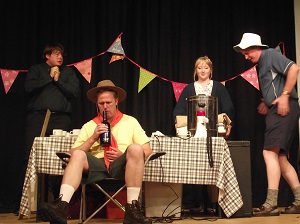
Alan Ayckbourn (Londen, 12 april 1939)
Scene uit een opvoering in Shifnal, Shropshire, 2011
De Amerikaanse schrijver en jurist Scott Turow werd geboren op 12 april 1949 in Chicago. Zie ook alle tags voor Scott Turow op dit blog.
Uit: Ordinary Heroes
“All parents keep secrets from their children. My father, it seemed, kept more than most.
The first clue came when Dad passed away in February 2003 at the age of eighty-eight, after sailing into a Bermuda Triangle of illness—heart disease, lung cancer, and emphysema—all more or less attributable to sixty years of cigarettes. Characteristically, my mother refused to leave the burial details to my sister and me and met the funeral director with us. She chose a casket big enough to require a hood ornament, then pondered each word as the mortician read out the proposed death announcement.
"Was David a veteran?" he asked. The undertaker was the cleanest-looking man I'd ever seen, with lacquered nails, shaped eyebrows, and a face so smooth I suspected electrolysis.
"World War II," barked Sarah, who at the age of fifty-two still raced to answer before me.
The funeral director showed us the tiny black rendering of the Stars and Stripes that would appear in the paper beside Dad's name, but my mother was already agitating her thinning gray curls.
"No," she said. "No war. Not for this David Dubin." When she was upset, Mom's English tended to fail her. And my sister and I both knew enough to keep quiet when she was in those moods. The war, except for the bare details of how my father, an American officer, and my mother, an inmate in a German concentration camp, had fallen in love, virtually at first sight, had been an unpleasantness too great for discussion throughout our lives. But I had always assumed the silence was for her sake, not his.
By the end of the mourning visitation, Mom was ready to face sorting through Dad's belongings. Sarah announced she was too pressed to lend a hand and headed back to her accounting practice in Oakland, no doubt relishing the contrast with my unemployment. Mom assigned me to my father's closet on Monday morning, insisting that I consider taking much of his clothing. It was nearly all disastrously out of fashion, and only my mother could envision me, a longtime fatso, ever shrinking enough to squeeze into any of it. I selected a few ties to make her happy and began boxing the rest of his old shirts and suits for donation to the Haven, the Jewish relief agency my mother had helped found decades ago and which she almost single-handedly propelled for nearly twenty years as its Executive Director.“
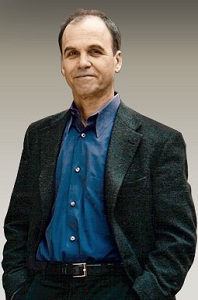
Scott Turow (Chicago, 12 april 1949)
De Amerikaanse schrijver Tom Clancy werd geboren op 12 april 1947 in Baltimore County, Maryland. Zie ook alle tags voor Tom Clancy op dit blog.
Uit: De tanden van de tijger (Vertaald door Hugo Kuipers)
“David Greengold was geboren in de meest Amerikaanse gemeenschap die er was, Brooklyn, maar op zijn bar mitswa was er iets belangrijks veranderd in zijn leven. Nadat hij had uitgeroepen: ‘Vandaag ben ik een man’, was hij naar het feest gegaan en had daar een paar familieleden ontmoet die uit Israel waren overgekomen. Zijn oom Moses had daar veel succes als diamanthandelaar. Davids eigen vader had zeven juwelierszaken, waarvan het vlaggenschip zich in 40th Street in Manhattan bevond.
Terwijl zijn vader en zijn oom het bij een glas Californische wijn over zaken hadden, was David aan de praat geraakt met zijn neef Daniel. Daniel, tien jaar ouder dan hij, werkte sinds kort voor de Mossad, de belangrijkste inlichtingendienst van Israel, en als een echte nieuweling vond hij het prachtig om zijn neef verhalen te vertellen. Daniel had zijn dienstplicht vervuld bij de Israelische para’s; hij had elf sprongen op zijn naam staan en ook enige actie meegemaakt in de Zesdaagse Oorlog van 1967.
Voor hem was het een mooie oorlog geweest. In zijn compagnie had niemand ernstig letsel opgelopen en ze hadden genoeg treffers gescoord om het op een jachtpartij te laten lijken – jagers die achter gevaarlijk, maar niet te gevaarlijk, wild aan zaten, met een afloop die heel goed paste bij de ideeen en verwachtingen die hij voor de oorlog had gekoesterd.
De verhalen hadden in sterk contrast gestaan met de sombere televisiebeelden van Vietnam waarmee in Amerika het journaal elke avond begon. Met het enthousiasme van zijn op die dag bevestigde religieuze identiteit had David onmiddellijk besloten meteen na zijn eindexamen naar zijn joodse thuisland te emigreren. Zijn vader, die in de Tweede Wereldoorlog in de Tweede Pantserdivisie van het Amerikaanse leger had gediend en over het geheel genomen weinig plezier aan dat avontuur had beleefd, had het helemaal geen prettig vooruitzicht gevonden dat zijn zoon naar een Aziatische jungle zou gaan om in een oorlog te vechten waarvoor zijn kennissen en hij geen enkel enthousiasme konden opbrengen, en dus vloog de jonge David na zijn eindexamen met El Al naar Israel om daar voorgoed te blijven. Hij spijkerde zijn Hebreeuws bij, vervulde zijn Israelische dienstplicht en werd toen net als zijn neef door de Mossad gerekruteerd.”

Tom Clancy (12 april 1947- 1 oktober 2013)
Cover
De Duitse schrijfster Agnes Sapper werd geboren op 12 april 1852 in München. Zie ook alle tags voor Agnes Sapper op dit blog.
Uit: Die Familie Pfäffling. Eine deutsche Wintergeschichte
„Im Hause Pfäffling war nach dem lauten Abgang der sieben Familienmitglieder eine ungewohnte Stille eingetreten. Es blieb nur noch die Mutter zurück, und Elschen, das jüngste niedliche Töchterchen, sowie die treue Walburg, die in der Küche wirtschaftete. Frau Pfäffling atmete auf, die Stille tat ihr wohl. Was war das für ein Sturm gewesen, bis der letzte die Türe hinter sich zugemacht hatte, und was für eine Unruhe all die Ferienwochen hindurch! Während sie ordnend und räumend von einem Zimmer ins andere ging, war ihr ganz festtäglich zu Mute. Sie war von Natur eine stille, nachdenkliche Frau und gern in Gedanken versunken, aber das Leben hatte sie als Mittelpunkt in einen großen Familienkreis gestellt, und es drehten sich lauter lebhafte, plaudernde, fragende, musizierende Menschen um sie herum. Während nun die Mutter sich der Ruhe freute, wußte Elschen gar nicht, wo es ihr fehlte. Allein zu spielen hatte sie ganz verlernt. So ging sie hinunter in den Hof, wo die großen Balken lagen. Oft hatte sie sich in den letzten Wochen geärgert, wenn sie ängstlich auf den glatten Balken kleine Schrittchen machte, daß die Brüder das so flink konnten und sie ihnen immer Platz machen sollte. Jetzt hatte sie alle die Baumstämme allein zu ihrer Verfügung, aber nun machten sie ihr keine Freude. Sie ging weiter zu den Brettern, die übereinander aufgestapelt lagen. Dort oben, wo ein kleines dickes Brett querüberlag, war Frieders Lieblingsplatz, auf dem er immer mit der Ziehharmonika saß. Wenn er gar zu lang spielte und sie nicht beachtete, war sie manchmal ungeduldig geworden und hatte sogar einmal gesagt, die Harmonika sei eine alte Kröte. Aber jetzt, dachte an ihn. Es war so langweilig heute morgen – fast zum weinen!
Da tat sich oben im Haus ein Fenster auf und der Mutter Stimme rief: »Elschen, flink, Essig holen!«
Einen Augenblick später wanderte auch Else die Frühlingsstraße hinunter, zwar nicht mit den Büchern in die Schule, aber mit dem Essigkrug zum nächsten Kaufmann.“
wo es überall ganz still war, hätte sie auch die Harmonika gern gehört. Sie setzte sich auf Frieders Platz und
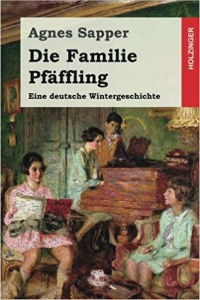
Agnes Sapper (12 april 1852 – 19 maart 1929)
Cover
De Engelse hoveling, dichter en toneelschrijver Edward de Vere, 17e graaf van Oxford, werd geboren op 12 april 1550 in Castle Hedingham. Zie ook alle tags voor Edward de Vere op dit blog.
When I was fair and young
When I was fair and young then favour graced me;
Of many was I sought their mistress for to be.
But I did scorn them all, and answered them therefore,
Go, go, go, seek some otherwhere,
Importune me no more.
How many weeping eyes I made to pine in woe;
How many sighing hearts I have no skill to show;
Yet I the prouder grew, and answered them therefore,
Go, go, go, seek some otherwhere,
Importune me no more.
Then spake fair Venus' son, that proud victorious boy,
And said, you dainty dame, since that you be so coy,
I will so pluck your plumes that you shall say no more
Go, go, go, seek some otherwhere,
Importune me no more.
When he had spake these words such change grew in my breast,
That neither night nor day I could take any rest.
Then, lo ! I did repent, that I had said before
Go, go, go, seek some otherwhere,
Importune me no more.

Edward de Vere (12 april 1550 – 24 juni 1604)
Portret door Marcus Gheeraedts, ca. 1590
De Puertoricaanse dichter José Gautier Benítez werd geboren op 12 april 1848 in Caguas. Zie ook alle tags voorJosé Gautier Benítez op dit blog.
Pueto Rico (Fragment)
A garden of enchantment, fountains playing
Above the azure sea that round you swirls,
A vase of many-colored flowers swaying
Amid the foam and coral, scents and pearls.
You who at dusk, spilling your colors, came
In all the hues of brilliant sunset dressed,
Filling the ocean full of floating flame
Till the last rays of sun died in the West.
You who supply the air I breathe each day
Inspiring my spontaneous song of praise,
Accept the adoring tribute of my lay
That as your inspired poet to you I raise!
The sacred love that lies within my breast
Would play for you its rustic harmony;
For you I cast it to the wind's unrest:
Your love compels the poet's heart to sing,
And in his song his heart he sends to thee.
My island, hark! This possibly could be
]My lyre's last note; for soon I will depart
For those far regions without memory.
My fleeing youth is weakening, wastes away,
An aching, sad, a melancholy soul
No longer in its jail content to stay.
Before I see that last day given me
And my song is extinguished with my breath,
Take, Homeland, my last lines of poetry:
They're testament and sign of my love's depth!
They're fond FAREWELL your singer sends to thee!
Vertaald door W. K. Jones en Roberto Màrquez
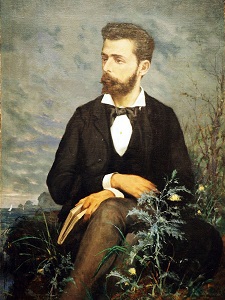
José Gautier Benítez (12 april 1848 – 24 januari 1880)
Portret door Francisco Oller, 1886
De Russische toneelschrijver Alexander Nikolajewitsj Ostrovski werd geboren op 12 april 1823 in Moskou. Zie ook alle tags voorAlexander Ostrovski op dit blog.
Uit:The Storm (Vertaald door Constance Garnett)
“KUDRIASH. Who could please him, when his whole life's spent in bullying people? Especially where money's at stake; no accounts are ever settled without storms of abuse. Often people are glad to go short of their due, if only he'll let them off quietly. Woe to us if anyone vexes him in the morning! He falls foul of everyone all day long.
BORIS. Every morning my aunt entreats us with tears in her eyes: "Don't anger him, friends! Dear boys, don't anger him!"
KUDRIASH. But you can never avoid it! If he goes to the bazaar, it's all up! He scolds all the peasants. Even if they ask him less than cost price they never get off without abuse. And then he's upset for the whole day.
SHAPKIN. He's a bully—there's no other word for him.
KUDRIASH. A bully? I should think he is!
BORIS. And what's fatal is if some man offends him, whom he daren't be rude to. Then all his household have to look out for themselves!
KUDRIASH. Bless my soul! That was a joke though. Didn't that hussar let him have it on the Volga, at the ferry! Oh, a lovely shindy he kicked up afterwards, too.
BORIS. Ah, and didn't his family suffer for it! Why, for a fortnight after we were all hiding away in the attics and cupboards.
KULIGIN. Surely that's not the folk coming back from vespers?
[Several persons pass in the background.
KUDRIASH. Come on, Shapkin, let's get a drink! It's no good stopping here.
[They bow and exeunt.”
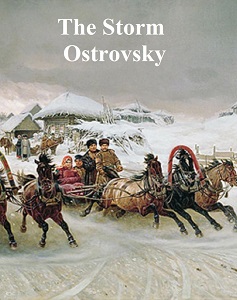
Alexander Ostrovski (12 april 1823 – 14 juni 1886)
Cover
De Franse schrijver Guillaume-Thomas Raynal (Abbé Raynal ) werd geboren op 12 april 1713 in Lapanouse de Séverac. Zie ook alle tags voor Guillaume-Thomas Raynal op dit blog.
Uit: L'Histoire des deux Indes
« Estimons-nous beaucoup les productions des colonies ?Je crois qu'on n'en fauroit douter. Pourquoi donc prenons -nous si peu d'intérêt à leur prospérité & à la conservation des colons? Que la fureur d'un ouragan ait enseveli des milliers de ces malheureux sous la ruine de leurs habitations , & le dégât de leurs possessions, nous nous en occupons moins que d'un duel ou d'un assassinat commis à notre porte. Qu'une vaste contrée de ce continent éloigné continue d'être dévastée par quelque épidémie, on s'en entretient ici plus froidement que du retour incertain d'une petite - vérole inoculée. Que les horreurs de la disette réduifent les habitant de Saint-Domingue ou de la Martinique à chercher leur nourriture dans la campagne, ou à se dévorer les uns les autres, nous y pren-drons moins de part qu'au fléau d'une grêle qui auroit haché les moissons de quelques-uns de nos villages. Il el assez naturel de penser que cette indifférence est un effet de l'éloignement , & que les colons ne font pas plus sensibles à nos malheurs que noix aux leurs. Mais, réplique-t-on, nos villes font contiguës à nos campagnes. Nous avons sans celle sous les yeux la misère de leurs habitans. Nous n'en desirons pas moins d'abondantes récoltes en tout genre, & l'on ne peut guère pousser plus loin le mépris pour l'encouragement , la multiplication & la conservation du cultivateur. »
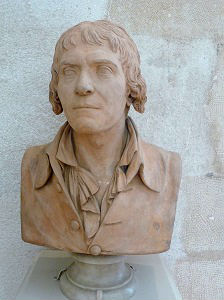
Guillaume-Thomas Raynal (12 april 1713 – 6 maart 1796)
Borstbeeld in het Musée des Beaux Arts, Dijon
Zie voor bovenstaande schrijvers ook mijn blog van 12 april 2007 en ook mijn blog van 12 april 2008 en eveneens mijn blog van 12 april 2009.
|



